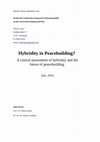Drafts by Laura Faludi
Thesis Chapters by Laura Faludi

This thesis intends to disentangle the various understandings of hybridity in peace-building, whi... more This thesis intends to disentangle the various understandings of hybridity in peace-building, while pointing out the weaknesses of its claims. Instead of considering it as an alternative to liberal peace-building, this work regards hybridity as a logical consequence of it, the same emperor in yet another set of new clothes (Richmond & Franks, 2008). Some of the criticism follows from within the discipline itself, drawing attention to the self-contradictory nature of some claims made by supporters of hybridity as well as the prevalence of established hierarchies and binaries. Another part of the critique targets the limited understanding of hybridity in peacebuilding at its source of post-colonial studies. Last, but not least it attempts to enhance the understanding of hybridity through the intersectional studies aiming at collapsing dominance structures and embracing plurality while realizing that this might as well signals the final stage in the gradual retreat of (liberal) peace-building. The question the thesis would ultimately wish to put, and maybe answer, is whether there is anywhere to go if hybridity fails? Would a response to fundamental criticism and different understandings of hybridity in peacebuilding mean an absolute end to external claims for any form of pre-eminence and whether the recognition of this finality would and should lead to the abandonment of peace-building interventions (in a form that we know them at least)? Albeit the last question seems to be easy to answer, emerging new pragmatist thinking might suggests otherwise (Chandler, 2016). Being an entirely conceptual work, this thesis resorts itself to an analysis of the discourse around hybridity in peacebuilding as well as the possible consequences of its failure.
Uploads
Drafts by Laura Faludi
Thesis Chapters by Laura Faludi